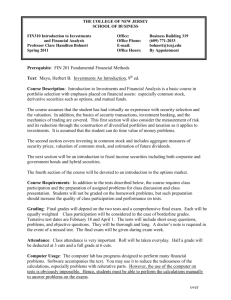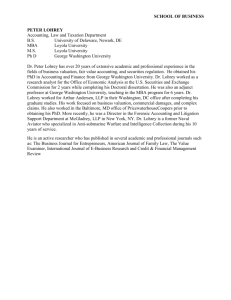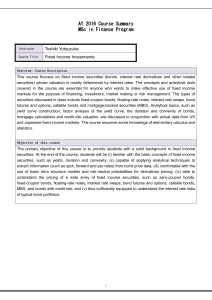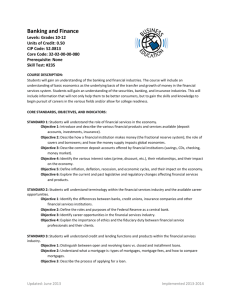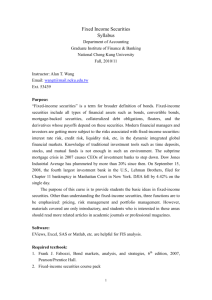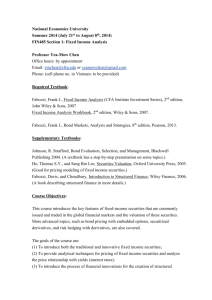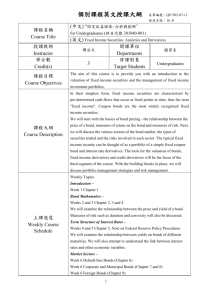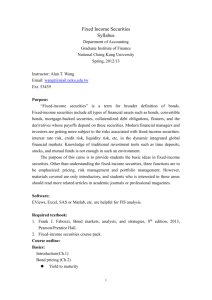FIN450 Fixed Income Analysis Summer 2010
advertisement
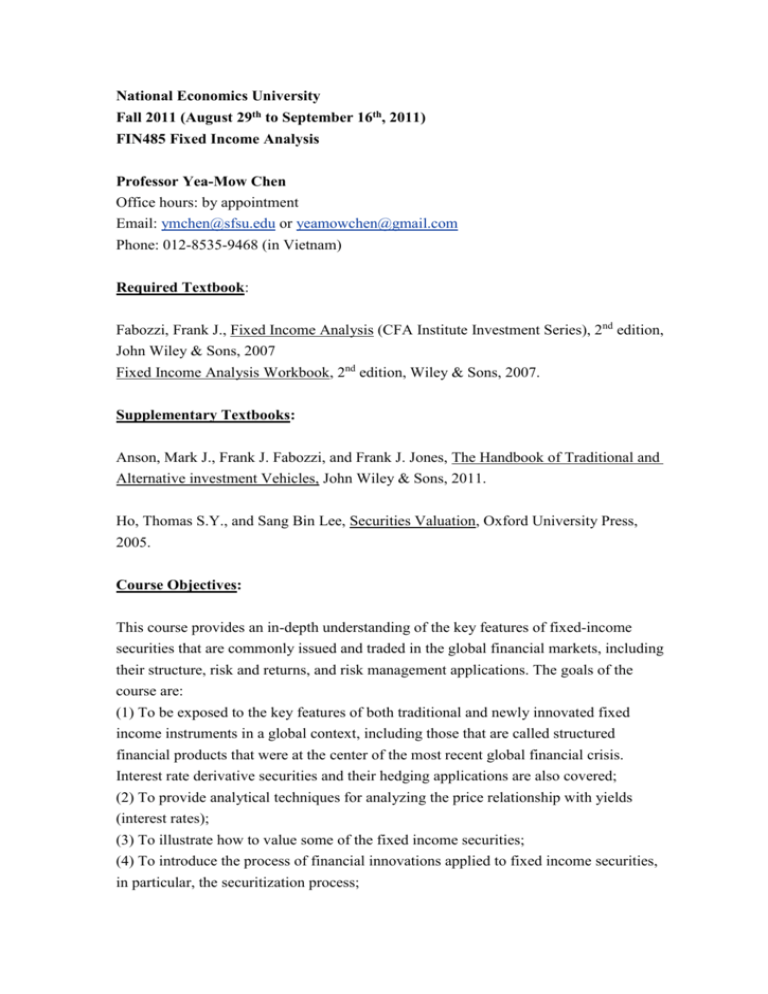
National Economics University Fall 2011 (August 29th to September 16th, 2011) FIN485 Fixed Income Analysis Professor Yea-Mow Chen Office hours: by appointment Email: ymchen@sfsu.edu or yeamowchen@gmail.com Phone: 012-8535-9468 (in Vietnam) Required Textbook: Fabozzi, Frank J., Fixed Income Analysis (CFA Institute Investment Series), 2nd edition, John Wiley & Sons, 2007 Fixed Income Analysis Workbook, 2nd edition, Wiley & Sons, 2007. Supplementary Textbooks: Anson, Mark J., Frank J. Fabozzi, and Frank J. Jones, The Handbook of Traditional and Alternative investment Vehicles, John Wiley & Sons, 2011. Ho, Thomas S.Y., and Sang Bin Lee, Securities Valuation, Oxford University Press, 2005. Course Objectives: This course provides an in-depth understanding of the key features of fixed-income securities that are commonly issued and traded in the global financial markets, including their structure, risk and returns, and risk management applications. The goals of the course are: (1) To be exposed to the key features of both traditional and newly innovated fixed income instruments in a global context, including those that are called structured financial products that were at the center of the most recent global financial crisis. Interest rate derivative securities and their hedging applications are also covered; (2) To provide analytical techniques for analyzing the price relationship with yields (interest rates); (3) To illustrate how to value some of the fixed income securities; (4) To introduce the process of financial innovations applied to fixed income securities, in particular, the securitization process; (5) To illustrate the mechanics and intuition of financial risk management (hedging) with fixed income securities. Pre-requisites: This class assumes thorough knowledge of Introductory Corporate Finance. Course Materials: (1) Lecture slides will be made available prior to each of the classes. (2) Review financial websites, such as bloomburg.com, finance.yahoo.com, marketwatch.com, cnbc.com, and financialtime.com for the daily developments in the global credit market. (3) A financial calculator with built-in functions for bond price calculations. . Grading: Grades will be determined based on the weighted average of the following items: two exams - one midterm (35%), a final (35%), and in-class quizzes (30%) for a total of 100%. Exams are open-book, but should be taken individually. In-class quizzes are to be offered randomly on certain meetings only, not on all. Calculator: To help speeding up your computation, you might need a financial calculator that is equipped with modules for present value and future value calculations. Exams: 1. The midterm and final exams will be open book and notes. 2. The use of a financial calculator will be permitted. 3. Exams will be individual effort. No discussions and passing of exam and study materials during the exam will be allowed. 4. Because of the short length of the session, there will be no make-up for any of the examinations. 5. If you miss any one of them for legitimate reasons, specifically medical, consult with me immediately. Homework Assignments: Numerical problems from the Workbook are assigned as homework problems. You are not required to turn them in, because solutions have been provided in the Workbook. You are, however, required to go over them after each chapter. We will review and/or answer some of the problems assigned. Class Attendance: This is an intensive three-week class and there is no time to make up any missing classes. If you miss any one of them, you are required to pick up all the readings and study by yourself. I can explain a few concepts with you, but I cannot repeat what I have gone over in the class. Warning: Not attending the class can result into lower course grade as you could miss the quits to be administered which accounts for 30% of the course grade. Useful Web Sites • Securities Industry and Financial Markets Association (SIFMA): http://www.bondmarkets.com • Securitization News: http://www.securitization.net • US Department of Treasury: http:/www.ustreas.gov • Federal Reserve Bank, information about spreads in fixed-income markets: http://www.federalreserve.gov/releases/H15/data.htm • Emerging market debt: http://www.bradynet.com • US municipal bond market: http://www.msrb.org • Credit ratings: – Moody’s: http://www.moodys.com – Standard & Poor’s (CBRS): http://www2.standardandpoors.com – DBRS: http://q9.dbrs.com/intnlweb/jsp/content/home.faces – Fitch: http://www.fitchratings.com FIN 485 Fixed Income Analysis Course Schedule (Notice that this schedule is subject to revision upon knowing the background of the class) Date (Week 1) Topic Readings Workbook Assignments 8/29/2011 (Monday) Introduction to Bond Valuation Global Bond Market Development 1 FEATURES OF DEBT SECURITIES Ch 1 Problem 3, 4, 5, 6 8/30/2011 (Tuesday) 2. RISKS ASSOCIATED WITH INVESTING IN Ch. 2 BONDS 3 OVERVIEW OF BOND SECTORS AND 12, 13, 15, 18 Ch.3 INSTRUMENTS 8/31/2011 4. UNDERSTANDING YIELD SPREADS (Wednesday) 4.1 Interest Rate Determination Problem 5, Problem 7, 18, Ch 4 Problem 5, 8, 12, 16, 17 4.2 U.S. Treasury Rates 4.3 Swap Spreads 5. VALUATION OD DEBT SECURITIES Ch 5 5.1 Traditional Approach to Valuation Problems 3, 5, 7, 9, 10 5.2 The Arbitrage-Free Valuation Approach 5.3 Valuation Models 9/1/2011 (Thursday 5. VALUATION OD DEBT SECURITIES Morning) 5.1 Traditional Approach to Valuation Ch 5 Problems 3, 5, 7, 9, 10 5.2 The Arbitrage-Free Valuation Approach 5.3 Valuation Models 6. YIELD MEASURES, SPOT RATES AND Problems 9, FORWARD RATES 10, 11, 14, 16, 6.1 Traditional Yield Measures 18, 19, 21, 25, 6.2 Theoretical Spot Rates 26, 28 6.3 Forward Rates 9/2/2011 (Friday) Ch. 6 National Holiday – No Class Review – to be made up on a later date Date (Week 2) Topic Readings Workbook Assignment 9/5/2011 (Monday) 6. YIELD MEASURES, SPOT RATES AND Ch 6 Problems 9, FORWARD RATES 10, 11, 14, 16, 6.1 Traditional Yield Measures 18, 19, 21, 25, 6.2 Theoretical Spot Rates 26, 28 6.3 Forward Rates 7. MEASURING INTEREST RATE RISK Ch. 7 7.1 Price Volatility Characteristics of Bonds Problems 11, 12, 13, 15, 16 7.2 Duration and Convexity 7.3 Price Value of a Basis Point 9/6/2011 (Tuesday) 7. MEASURING INTEREST RATE RISK Ch 7 7.1 Price Volatility Characteristics of Bonds Problems 11, 12, 13, 15, 16 7.2 Duration and Convexity 7.3 Price Value of a Basis Point 8 TERM STRUCTURE AND VOLATILITY OF Ch. 8 INTEREST RATES 9/7/2011 Midterm I (Wednesday) 8 TERM STRUCTURE AND VOLATILITY OF Ch 8 INTEREST RATES Problems 14, 17, 18, 19, 21 8.1 Construct a Spot Rate Curve 8.2 The Swap Curve 8.3 Theories on the Terms Structure 8.4 Measuring Yield Curve Risk 9/8/2011 (Thursday 9. VALUING BONDS WITH EMBEDDED OPTIONS Morning) 9.1 Valuing an Option-Free Bond 9.2 Using the Binomial Model 9.3 Valuing Callable and Putable Bonds 9.4 Analysis of Convertible Bonds 9/9/2011 (Friday) Review Ch 9 Problems 5, 7, 12, 21, 22, 23 Date (Week 3) Topic Readings Workbook Assignment 9/12/2011 (Monday) 9. VALUING BONDS WITH EMBEDDED Ch 9 OPTIONS (Continued) Problems 5, 7, 12, 21, 22, 23 9.1 Valuing an Option-Free Bond 9.2 Using the Binomial Model 9.3 Valuing Callable and Putable Bonds 9.4 Analysis of Convertible Bonds 9/13/2011 (Tuesday) 10 MORTGAGE-BACKED SECTOR Ch 10 Problems 1, 2, 10.1 Residential Mortgage Loans 4, 5, 6, 7, 8, 10.2 Mortgage Passthrough Securities 10, 13, 14, 28, 10.3 Collateralized Mortgage Obligations 29, 31 10.4 Stripped Mortgage-Backed Securities 9/14/2011 10 MORTGAGE-BACKED SECTOR (Wednesday) 10.1 Residential Mortgage Loans 4, 5, 6, 7, 8, 10.2 Mortgage Passthrough Securities 10, 13, 14, 28, 10.3 Collateralized Mortgage Obligations 29, 31 Ch. 10 Problems 1, 2, 10.4 Stripped Mortgage-Backed Securities 11. Asset-Backed Securities Ch. 11 11.1 The Securitization Process and Features of ABS Problems 4, 5, 15, 25, 36 11.2 Residential ABS 11.3 Other Asset ABS 11.3 Collateralized Debt Obligations (CDOs) 9/15/2011 (Thursday 22 CONTROLLING INTEREST RATE RISK WITH Ch. 22 Problems 3, Morning) DERIVATIVES 12, 16, 17, 21, 22.1 Controlling Interest Rate Risk with Futures 22 22.2 Controlling Interest Rate Risk with Swaps 22.3 Hedging with Options 22.4 Using Caps and Floors 9/16/2011 (Friday) Review Note: * Depending on the pace of the class, we may cover only a portion of the chapter or skip the chapter. Final Exam will be scheduled by the Department.
